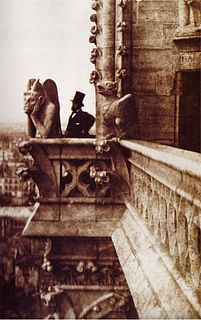A Quote by Claude Monet
The effect of sincerity is to give one's work the character of a protest. The painter, being concerned only with conveying his impression, simply seeks to be himself and no one else.
Related Quotes
Solitude is the profoundest fact of the human condition. Man is the only being who knows he is alone, and the only one who seeks out another. His nature - if that word can be used in reference to man, who has ‘invented’ himself by saying ‘no’ to nature - consists in his longing to realize himself in another. Man is nostalgia and a search for communion. Therefore, when he is aware of himself he is aware of his lack of another, that is, of his solitude.
I am not concerned with simply surviving. I am very concerned about improving. I start each day by examining yesterday's work and looking for areas where I can improve. I am always trying to draw the characters better, and trying to design each panel somewhat in the manner a painter would treat his canvas.
The aura given out by a person or object is as much a part of them as their flesh. The effect that they make in space is as bound up with them as might be their colour or smell ... Therefore the painter must be as concerned with the air surrounding his subject as with the subject itself. It is through observation and perception of atmosphere that he can register the feeling that he wishes his painting to give out.
I think you may judge of a man’s character by the persons whose affection he seeks. If you find a man seeking only the affection of those who are great, depend upon it he is ambitious and self-seeking; but when you observe that a man seeks the affection of those who can do nothing for him, but for whom he must do everything, you know that he is not seeking himself, but that pure benevolence sways his heart.
If the artist does not fling himself, without reflecting, into his work, as Curtis flung himself into the yawning gulf, as the soldier flings himself into the enemy's trenches, and if, once in this crater, he does not work like a miner on whom the walls of his gallery have fallen in; if he contemplates difficulties instead of overcoming them one by one ... he is simply looking on at the suicide of his own talent.
The Great Man's sincerity is of the kind he cannot speak of, is not conscious of: nay, I suppose, he is conscious rather of insincerity; for what man can walk accurately by the law of truth for one day? No, the Great Man does not boast himself sincere, far from that; perhaps does not ask himself if he is so: I would say rather, his sincerity does not depend on himself; he cannot help being sincere!
The fact that labour is external to the worker, i.e., it does not belong to his intrinsic nature; that in his work, therefore he does not affirm himself but denies himself, does not feel content but unhappy, does not develop freely his physical and mental energy but mortifies his body and his mind. The worker therefore only feels himself outside his work, and in his work feels outside himself.
Not simply the righteousness of our Saviour, not simply the beauty of His holiness or the graces of His character, are we to put on as a garment. The Lord Himself is our vesture. Every Christian is not only a Christ bearer, but a Christ wearer. We are so to enter into Him by communion, to be so endued with His presence, and imbued with His Spirit that men shall see Him when they behold us, as they see our garments when they look upon our bodies.
When a patient says he feels stuck and confused, and through good intentions he struggles to become loose and clear, he only remains chronically trapped in the mire of his own stubbornness. If instead he will go with where he is, only then is there hope. If he will let himself get deeply into the experience of being stuck, only then will he reclaim that part of himself that is holding him. Only if he will give up trying to control his thinking, and let himself sink into his confusion, only then will things become clear. (64)






































